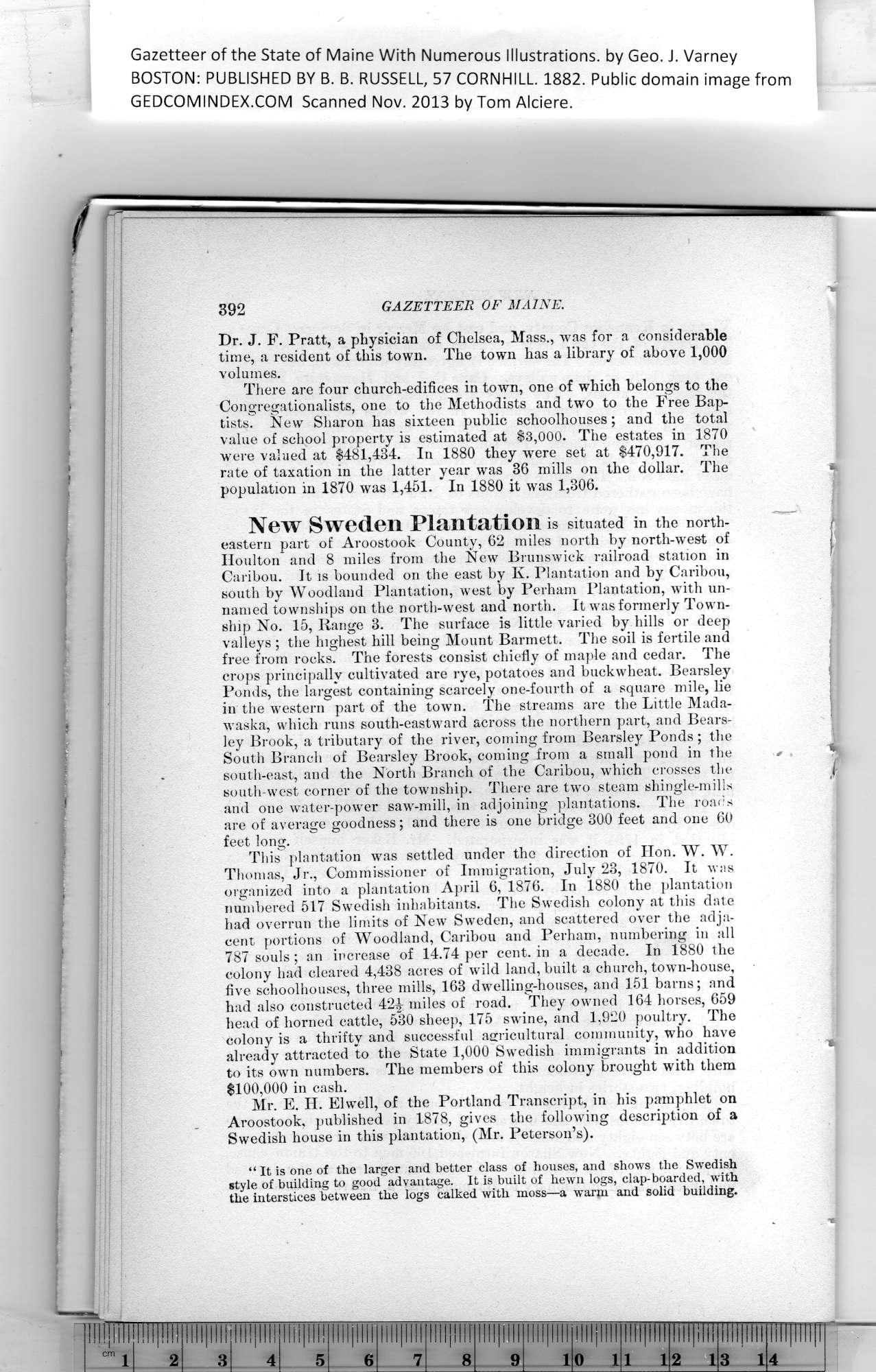|
Gazetteer of the State of Maine With Numerous Illustrations, by Geo. J. Varney
BOSTON. PUBLISHED BY B. B. RUSSELL, 57 CORNHILL. 1882. Public domain image from
GAZETTEER OF MAINE.
Dr. J. F. Pratt, a physician of Chelsea, Mass., was for a considerable
time, a resident of this town. The town has a library of above 1,000
volumes.
There are four church-edifices in town, one of which belongs to the
Congregationalists, one to the Methodists and two to the Free Bap-
tists. New Sharon has sixteen public schoolhouses; and the total
value of school property is estimated at $3,000. The estates in 1870
were valued at $481,434. In 1880 they were set at $470,917. The
rate of taxation in the latter year was 36 mills on the dollar. The
population in 1870 was 1,451. In 1880 it was 1,306.
New Sweden Plantation is situated in the north-
eastern part of Aroostook County, 62 miles north by north-west of
Houlton and 8 miles from the New Brunswick railroad station in
Caribou. It is bounded on the east by K. Plantation and hy Caribou,
south by Woodland Plantation, west by Perham Plantation, with un-
named townships on the north-west and north. It was formerly Town-
ship No. 15, Range 3. The surface is little varied by hills or deep
valleys ; the highest hill being Mount Barmett. The soil is fertile and
free from rocks. The forests consist chiefly of maple and cedar. The
crops principally cultivated are rye, potatoes and buckwheat. Bearsley
Ponds, the largest containing scarcely one-fourth of a square mile, lie
in the western part of the town. The streams are the Little Mada-
waska, which runs south-eastward across the northern part, and Bears-
ley Brook, a tributary of the river, comiug from Bearsley Ponds ; the
South Branch of Bearsley Brook, coming from a small pond in the
south-east, and the North Branch of the Caribou, which crosses the
south-west corner of the township. There are two steam shingle-mills
and one water-power saw-mill, in adjoining plantations. The roads
are of average goodness; and there is one bridge 300 feet and one 60
feet long.
This plantation was settled under the direction of Hon. W. W.
Thomas, Jr., Commissioner of Immigration, July 23, 1870. It was
organized into a plantation April 6, 1876. In 1880 the plantation
numbered 517 Swedish inhabitants. The Swedish colony at this date
had overrun the limits of New Sweden, and scattered over the adja-
cent portions of Woodland, Caribou and Perham, numbering in all
787 souls ; an increase of 14.74 per cent, in a decade. In 1880 the
colony had cleared 4,438 acres of wild land, built a church, town-house,
five schoolhouses, three mills, 163 dwelling-houses, and 151 barns; and
had also constructed 42£ miles of road. They owned 164 horses, 659
head of horned cattle, 530 sheep, 175 swine, and 1,920 poultry. The
colony is a thrifty and successful agricultural community, who have
already attracted to the State 1,000 Swedish immigrants in addition
to its own numbers. The members of this colony brought with them
$100,000 in cash.
Mr. E. H. Elwell, of the Portland Transcript, in his pamphlet on
Aroostook, published in 1878, gives tbe following description of a
Swedish house in this plantation, (Mr. Peterson’s).
“ It is one of the larger and better class of houses, and shows the Swedish
style of building to good advantage. It is built of hewn logs, clap-boarded, with
the interstices between the logs calked with moss—a -warm and solid building.
PREVIOUS PAGE ... NEXT PAGE
This page was written in HTML using a program written in Python 3.2
|
